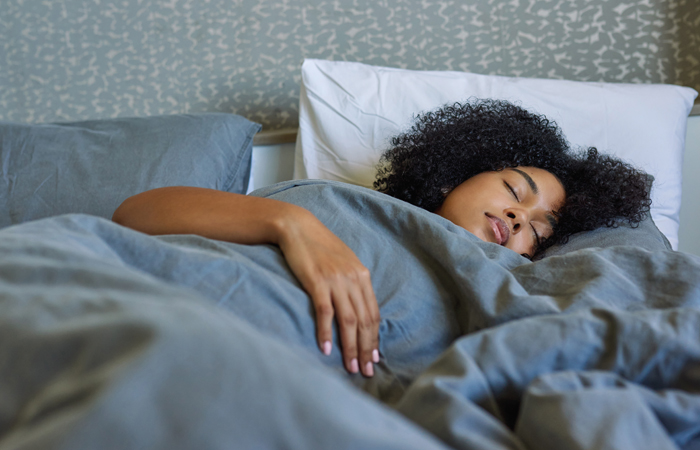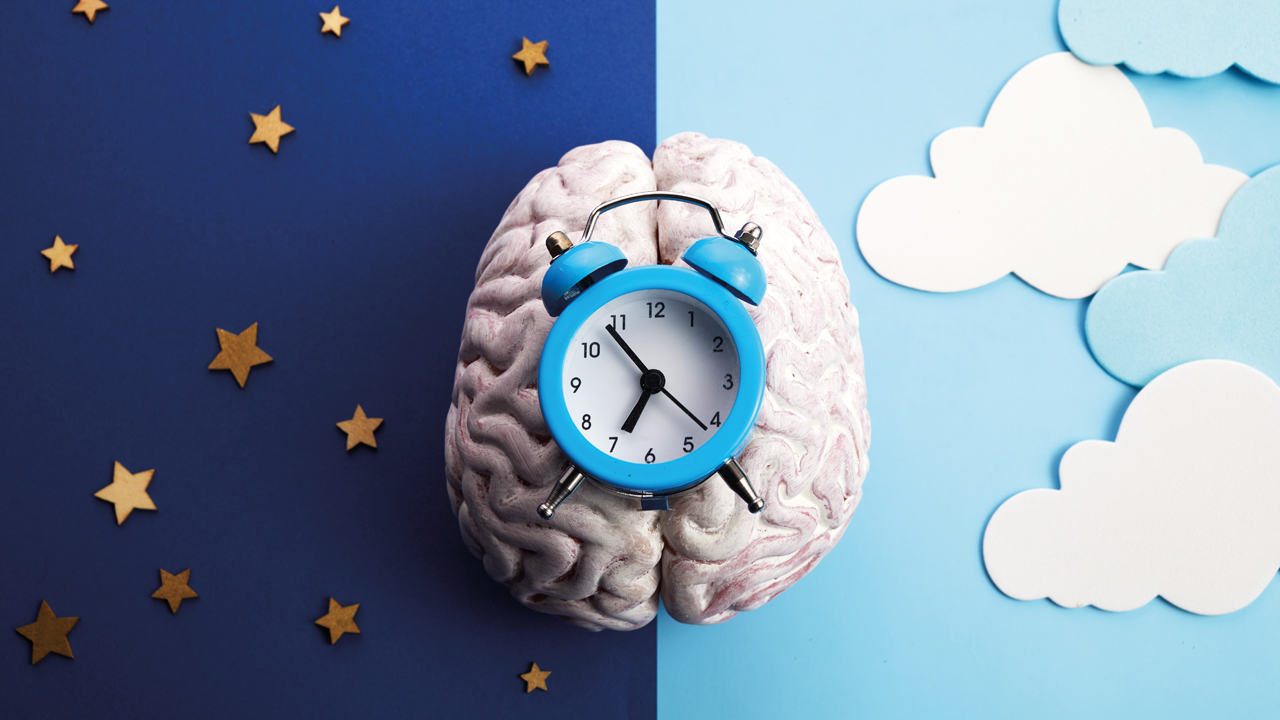In In-depth
Follow this topic
Bookmark
Record learning outcomes
Today, we switch on light bulbs more powerful than a fist full of candles. We hold tablets and smartphones close to our faces
Instead of the quieting of nature settling into its nocturnal pattern, we bombard ourselves with stimulating television or videos and distressing news of wars and natural disasters. And we wonder why we can’t sleep.
Sleep is the most obvious example of a circadian rhythm: a 24-hour long biological cycle. “Historically, we have underestimated the importance of circadian rhythms to our biology, behaviour and well-being. We now feel that understanding our circadian rhythms could make a dramatic difference to the diagnosis and treatment of numerous diseases,” says Dr Vikki Revell, senior lecturer in Translational Sleep and Circadian Physiology, at the University of Surrey’s Sleep Research Centre.
Circadian rhythms allow us to meet the changing challenges we face each day. “We’re not as active at two o’clock in the morning as we are at two in the afternoon,” Dr Revell says. “So, respiration, cardiovascular performance, metabolism and many other aspects of our biology change over the day. This means, for example, that we are ready to face the day when we wake up in the morning.”
Your master clock
Almost every cell in your body roughly follows circadian rhythms. But each cell cannot keep its own beat. Imagine what would happen if each instrument in an orchestra followed a separate rhythm.
A part of the brain, called the suprachiasmatic nuclei (SCN), is our master clock. The retina, the light-sensitive layer at the back of the eye, sends nerves to the SCN. This allows the SCN to synchronise with the day/night cycle. The SCN then sends signals along nerves throughout the body, influences the release of several hormones and other chemical messengers, and controls rhythms in body temperature. So, the SCN synchronises the clocks in other organs. Additional signals, such as mealtimes, help fine-tune the circadian rhythms.1
Over-ruling these synchronised rhythms can be bad for your health. A recent paper commented that: “Maintaining synchrony is key to optimal health, and this includes synchrony between our internal clocks and the external world, as well as synchrony among all the internal clocks.”1 In other words, disrupting these patterns can cause or contribute to several diseases, as we’ll see by considering two common conditions: asthma and high blood pressure (hypertension).
The rhythm of disease
Asking someone with asthma if they wake breathless at night offers a snapshot into how well their disease is controlled. If they wake with asthma, they may need a review and you should advise them to speak to a doctor or pharmacist.
Airways narrow at night even in healthy people. In some people, however, this can trigger asthma. The cause isn’t clear. Suggested explanations include increased exposure to certain immune triggers, sinusitis, cool air and circadian variations in hormone secretions.
Whatever the reasons, airways are narrowest at approximately 4am. Symptoms are often worse at about the same time. The number of eosinophils, a type of white blood cell that causes some asthma cases, also peaks in the lungs at about 4am.2 These patterns may influence how well asthma drugs work. “Studies of people with asthma can produce different diagnostic results depending on the time of day that samples are taken,” explains Dr Revell.
Blood pressure offers another example of the importance of considering circadian variations. GPs often measure blood pressure over 24 hours (called ambulatory or Holter monitoring) as the person goes about their daily life. Ambulatory monitoring offers a much more accurate evaluation of blood pressure than a single measurement taken in the surgery or pharmacy.
In healthy people, blood pressure begins declining in the late evening. Blood pressure reaches its lowest level around midnight and rises rapidly just after you wake in the morning.3 In healthy people, blood pressure dips by 10-20 per cent overnight. This dip is important for cardiovascular health. People without this night-time dip are, for instance, more likely to develop and die from cardiovascular disease or experience renal or eye disease caused by hypertension.4
Increasingly, researchers believe that the treatment of these and many other diseases may need to reflect circadian rhythms. “We’ve made massive advances in medicines for cardiovascular disease and cancer. But the best way to use these drugs may not yet be fully understood,” adds Dr Revell. “For example, if the metabolism [breakdown] of certain medicines varies during the day, should we adjust the timing of dosing accordingly?”

Don’t underestimate sleep
After thousands of years of little more than guesses, scientists now think they know why we spend a third of our lives asleep. “Our ancestors slept to avoid predators,” Dr Revell explains. “When we sleep, we also consolidate our memories and flush out waste products from our brains.”
Not surprisingly, disrupting this fundamental rhythm can affect our health and wellbeing. “Being woken unexpectedly during the night or being awake during the night can disrupt our circadian rhythms and throw our bodies into chaos,” says Dr Revell. “Shift work poses a particular problem. Sleeping during the day against your body clock will not be as restorative as that during the night. In addition, shift work can disrupt the immune system. This may contribute to the increased risk of breast and certain other cancers in people who work shifts.”
Sleep disturbances are also particularly common among people with mental health problems, including schizophrenia, bipolar disorder, anxiety and depression. Indeed, people can become trapped in a cycle where their mental health problems can trigger sleep disturbances. In turn, sleep disturbances exacerbate the mental health problems.
“Sleep disturbances may lead to symptoms of depression and anxiety, and also depression and anxiety may lead to sleep disturbances,” adds Dr Revell. “The structure of sleep can also change in people with mental health conditions. People with depression and anxiety, for example, can experience difficulties falling asleep, numerous wakings during the night and early-morning waking.”
Dr Revell notes that many other diseases illustrate the intimate relationship between sleep and well-being. For example, sleep disturbances may develop several years before people develop memory loss and the other symptoms of Alzheimer’s disease.
People with Alzheimer’s disease show deposits of certain proteins in their brains. Slowly, over many years, these deposits damage the brain. As we’ve seen, sleep flushes waste products from the brain but sleep disturbances may allow the deposits to build up. As it worsens, Alzheimer’s disease may damage parts of the brain involved in sleep. “Again, the two aspects can feed back on each other making matters worse,” Dr Revell adds.
How you can help
So, how can you help people, or yourself, get a good night’s sleep? Dr Revell suggests asking people simply “how well do you feel you sleep” or “how long do you spend in bed” can suggest that they may have a sleep problem. The NHS provides a list of signs that may suggest someone is experiencing sleep problems.
“People with sleep problems should try to follow good sleep hygiene including avoiding lots of light during the evening and the blue light from smartphones and tablets. If you have to use these, turn on the night-time setting, which cuts out the blue light,” says Dr Revell. “You can also suggest that people with sleep problems avoid simulating television or distressing news or programmes late in the evening, make sure their bedroom is a comfortable temperature, as dark as possible and with minimal distractions. Many people with sleep problems benefit from relatively simple changes.”
If lifestyle changes fail to solve the sleep problem, a patient may need anxiolytics, antidepressants, hypnotics (sleeping pills) and OTC sleep remedies, such as those containing diphenhydramine (a sedating antihistamine) or the herbs passion flower, valerian and hops. These do not replace sleep hygiene. Indeed, Dr Revell warns, anxiolytics, antidepressants and hypnotics can change the structure of sleep. But hypnotics and sleep remedies may give sleep hygiene time to work.
Beyond the day
Our rhythms do not just follow 24-hour rhythms. Menstruation, of course, occurs roughly every 28-days. About three in every five women with migraines experience worse headaches around or during their period. Many women feel that these menstrual attacks are worse than migraines at other times of the month.5
Each autumn and winter, and less commonly in the spring or summer, some people experience profound sadness. For some, the low mood tips into depression. This seasonal affective disorder (SAD) is relatively common. Overall, up to one in 40 of the population, and between one in five and one in 10 of people with depression, experience SAD.6
Quite why seasonal affective disorder emerges isn’t clear. But the shorter hours of daylight as we head for midwinter probably contribute. “In addition to the changes in light, we spend more time inside during the autumn and winter, which could contribute to seasonal mood disorders,” says Dr Revell. “Light boxes can, however, be very effective in people with seasonal affective disorder.”
Age can also dramatically change circadian rhythms generally and sleep patterns particularly: the source of the numerous jokes and arguments about adolescents staying out late then sleeping in. But this may be hard-wired in the adolescent brain. “Teenagers tend to naturally go to sleep and wake later than older people. Sleep becomes more fragmented in older people,” adds Dr Revell. “In addition, the synchronisation between the circadian rhythms can break down as people get older.”
One reason may be that less light reaches the retina as you get older. “The lens in the eye can yellow with age, which reduces the amplitude [strength] of the circadian rhythm. So, the signal that synchronises the body’s various clocks is weaker,” says Dr Revell. “In addition to sleep, the normal variations in the immune system and metabolism also become weaker with age. Increasingly, drug companies consider age-related changes when developing new medicines.”
In the meantime, the entire pharmacy team needs to ensure everyone understands the value of a good night’s rest and the harm we can cause by opposing our natural circadian rhythms. “We need to raise awareness that spending too little or too much time asleep isn’t good for our health or well-being,” concludes Dr Revell. “Simple sleep hygiene can be really powerful and make a real difference.”
References
1. Obesity 2023; DOI:10.1002/oby.23666
2. American Journal of Respiratory and Critical Care Medicine 2018;198:1578-1581
3. Vascular Health and Risk Management 2013;9:125-33
4. PLoS One 2023;18:e0281151
5. Journal of Neurology 2022
6. American Family Physician 2020;102:668-672

